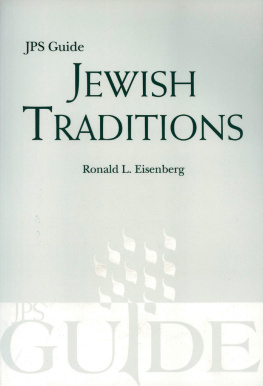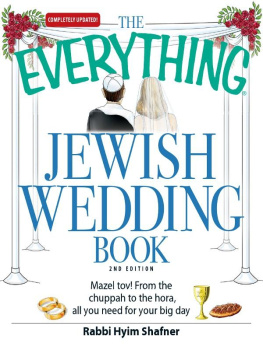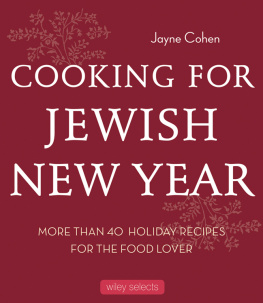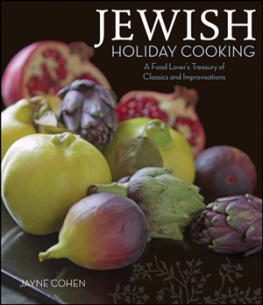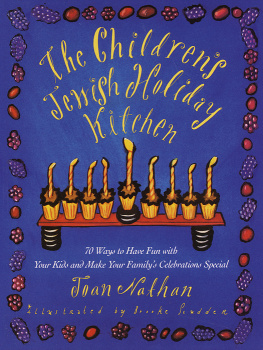



This book is dedicated to my wife, children, and grandchildren, who make all of our celebrations joyful.

Text copyright 2014 by Chronicle Books LLC.
Illustrations copyright 2014 by Yelena Bryksenkova.
All rights reserved. No part of this book may be reproduced in any
form without written permission from the publisher.
Library of Congress Cataloging-in-Publication Data:
Tauber, Ronald.
The Little book of Jewish celebrations / Ronald Tauber.
pages cm
ISBN 978-1-4521-3141-2 (hc)
ISBN 978-1-4521-3959-3 (epub, mobi)
1. Fasts and feastsJudaism. I. Title.
BM690.T455 2014
296.4'3dc23
2013040513
Designed by Allison Weiner
Text by Ronald Tauber
Chronicle Books LLC
680 Second Street
San Francisco, California 94107
www.chroniclebooks.com
CONTENTS
INTRODUCTION
And you shall be altogether joyful.
deuteronomy 16:15
J ewish holidays and days of celebration are warm, joyous affairs centered around the foundations of Jewish life: family, prayer, and festive meals. From the Passover seder table to the breaking of a glass under the chuppah at a wedding, most of the celebrations commemorate events in Jewish history recounted in the Bible and include traditions that have been practiced over more than two millennia. The Sabbath, major holy days, and rites of passage provide the fuel that have kept the Jewish faith glowing, even in times of strife. This book is a tribute to the time-honored customs that enrich Jewish life, connecting Jews from all corners of the world in celebration. In it youll find the customs and traditions associated with each special day, its scriptural sources and origins, and the important words related to the holiday. Refer to these pages to revel in the meaning of each holiday, or to learn of the customs associated with a lifecycle event.

HOLIDAYS
BIBLICALLY MANDATED HOLIDAYS AND THE SABBATH
W hile each holiday has its own prescribed rituals, prayers, and practices, many Jewish holidays share common features. The Sabbath and the most important Jewish holidays are mandated in the Torah. These holidays are Rosh Hashanah, Yom Kippur, Sukkot and its concluding Eighth Day of Assembly, Passover, and Shavuot. The Torah prescribes rituals for these special days and requires cessation from work. Three of these holidays, Sukkot, Passover, and Shavuot, are pilgrimage festivals, which in ancient times required a visit to the Temple in Jerusalem. According to the Torah, God liberated the Jewish people from slavery in Egypt, gave them His laws on Mount Sinai, and sustained them in the desert before leading them to the Promised Land of Israel. The Exodus from Egypt and its immediate aftermath constitute the central biblical event in the development of the Jewish religion and of the Jewish peoplehood. The three pilgrimage festivals relate directly to the Exodus: Passover celebrates the Exodus itself; Shavuot (the Feast of Weeks) commemorates the giving of the Torah seven weeks later; and the Feast of Sukkot is a remembrance of the temporary dwellings the Jews inhabited during their forty years of wandering after they left Egypt.
Rosh Hashanah, which marks the Jewish New Year, and Yom Kippur, the Day of Atonement, are also mandated by the Torah. Known together as the High Holy Days or Days of Awe, they are a time for reflection, prayer, and self-improvement. On these days, Jews remember Gods relationship with the biblical Patriarchs, Abraham, Isaac, and Jacob, and His covenant with their descendants. Rosh Hashanah, like the pilgrimage festivals, is a joyous holiday as well as a solemn one. Yom Kippur is considered the holiest day of the year and Jews fast to comply with the biblical commandment to afflict their souls.
Each of these Torah-mandated holidays has its own set of rituals and customs. These practices elevate the holidays above everyday life, encourage spending meaningful time with family and the extended Jewish community, and in turn arouse the interest and curiosity of children. Through these ancient customs, these celebrations become vehicles for passing down Jewish tradition to the next generation. On Passover, Jews eat special foods, including unleavened bread and bitter herbs, to recall the bitterness of slavery in Egypt. During Sukkot, they eat their meals in temporary dwellings to remember the wanderings in the desert after the Exodus. On Rosh Hashanah, a rams horn is sounded to call the congregation to prayer and reflection. These rituals and many others described in the following chapters have developed over the centuries and connect Jews around the globe through common practices.
Sabbath observance is mandated in the Torah and included specifically in the Ten Commandments, which contain the fundamental moral and religious principles of faith. In addition to the cessation of productive work activity, the Jewish Sabbath is a time for families to come together. It is marked by three special meals, blessings over wine and Sabbath bread, prayer service, and readings from the Torah and Prophets in the synagogue.
HISTORIC HOLIDAYS
T he remaining festivalsPurim and Chanukahare not mandated by the Torah. The story of Purim is recounted in great detail in the Book of Esther, which is within the Writings (Ketuvim) of the Tanakh. Purim celebrates the salvation of the Jewish people from the threat of genocide in ancient Persia. Much like a fairy tale, the story has a powerful king, a heroic queen, a sly villain, and a happy ending. The holiday is celebrated with special foods, the reading of the Book of Esther, a special meal, and gifts to friends and the poor.
Chanukah celebrates the extraordinary victory of the Jews over the Syrian-Greek kingdom. The Jews were led by a small group known as the Maccabees, who reconsecrated the holy Temple in Jerusalem. In commemoration of the victory and the discovery of a small supply of consecrated oil that miraculously burned for eight days, Jews celebrate the holiday by lighting a special candelabra. Like Purim and many other Jewish holidays, many of Chanukahs customs and rituals are centered around children and family.
what is the old testament?
Jewish Scripture, often referred to as the Old Testament, is more properly called Tanakh , an acronym for Torah (the Pentateuch or Five Books of Moses), Neviim (Prophets, such as Samuel, Isaiah, and Jeremiah), and Ketuvim (Writings, which includes Proverbs, Song of Songs, and Ruth).
THE HEBREW CALENDAR
J ewish holidays are governed by the Jewish calendar, which is based primarily on lunar months. The twelve lunar months are approximately eleven days shorter than the solar calendar of 365 days, so in seven years out of a cycle of nineteen years, an extra month is added. This solar adjustment is necessary so that the holidays remain within their relative season and Passover remains the Holiday of Spring, as it is sometimes called.
Next page

